|
|
|
Country:
Malaysia is located north of the Equator right in the heart
of the South East Asia. It consists of the peninsular in the west and,
across the South China Sea, Sabah and Sarawak on the island of Borneo in the east. |
Click here to enlarge
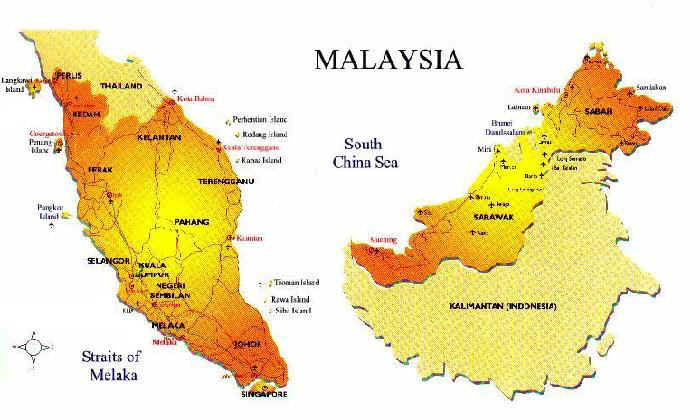 |
|
|
|
|
The country is federation of 13 states and 2 federal
territories. It is a parliamentary democracy with a constitutional monarchy.
Its is economy is dependent on the manufacturing,
agricultural and mining sectors. Malaysia is a major exporter of electronic
components an equipment, petroleum, palm oil and natural rubber. |
Geographical Location : Located 7 degrees north of the Equator,
Peninsular Malaysia is separated from the states of Sabah and Sarawak by
the South China Sea. In the north of the peninsula is Thailand while its
southern neighbor is Singapore. |
|
|
|
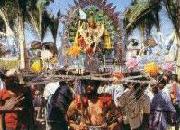 |
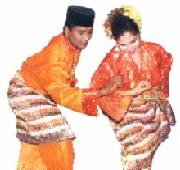 |
Area :
329,758sq km
Population :
20 Million
Capital :
Kuala Lumpur
| |


|
|
Clothing & Etiquette
:
The tropical weather favour light, casual clothing Most restaurants and
nightspots are not restrictive with the dress code, If in doubt, ring up
beforehand to check. Topless bathing in illegal on the beaches. Loose
clothes that cover the arms and legs may be required when entering place of
worships. Dress conservatively. take off your shoes before entering temples,
mosques or someone's house. |
|


|
TIME: The standard Malaysian Times is
* 8 hours ahead of the Greenwich Mean Time
* 16 hours ahead of US Pacific standard
* Time (Sand Francisco and Los Angeles) 13 hours ahead of US Standard Time (New York)
* 2 hours behind Australian Eastern Standard time (Syney and Melbourne) |
|
|
|
|
People |
:
Malays who make up about 75% of the population are the predominant |
|
group
with Chinese, Indian and other ethnic groups making up the rest. |
|
Language |
:
Bahasa Melayu (Malay) is the national language but English is widely
|
|
spoken. The ethnic group also speak various languages and dialects |
|
Religion |
:
Islam is the national religion but al other religions are practiced freely. The |
| Malays are almost all
Muslims; the Chinese, Buddhists; the Indians, Hindus, Muslim or Sikhs. Christianity
is embraced by both the Chinese and Indians |
|
Government |
:
Parliamentary democracy with a bicameral legislative system. The Head of
|
|
State is the Yang Di-Pertuan Agong and the Head of Government is the |
|
Prime Minister. | |
|
|
|
Climate
:
Tropical climate with warm and humid weather all year round. Temperatures range from 21º C to 32º
C. Annual rainfall varies from 2000mm to 2500mm
|
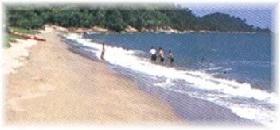
|
Electricity
: Supply is 200 - 240, 50 cycles. Adaptors Can be requested in
most hotels, Power sockets are of the three-square-pin type.
|
History Culture :
There is a strong interlink between the country's multi-racial and multicultural make-up with
its history. Besides the local Malays and the native groups, immigrants from China, India,
Indonesia and other parts of the world have all contributed to the multiracial
composition of its population. Its interesting cultural diversity can be largely attributed
to the country's long and on-going interaction with the outside world and colonial rule by
the Portuguese, Dutch and the British. Consequently, the evolution of the country into
cultural melting pot is evident in the unique blend of religions, socio-cultural activities
and traditions, dressing, languages and food.
The country achieved independence on 31st, August 1957 as the Federation of Malaysia
and Subsequently with the entry of Sabah and Sarawak, Malaysia was formed. | |
|
|
|
Major Holidays : | |
| New Year's Day |
- 1st January |
| Hari Raya Aidil Fitri |
- January / February |
| Chinese New Year |
- January / February |
| Awal Muharram |
- April |
| Labor Day |
- 1st May |
| Wesak Day |
- May
| | King's Birthday |
- 6th June |
| National Day |
- 31st August |
| Deepavali |
- October / November |
| Christmas |
- 25th December |
| 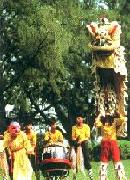
Chinese
Culture |
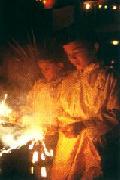
Malay Culture |
|
|
|
Economic Profile :Manufacturing constitutes the
larges single component of Malaysia economy. Tourism and primary commodities such as petroleum,
palm oil, natural rubber and timber are major contributors to its economy.
|
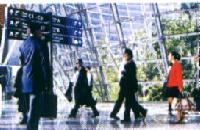
|
|
|
|
Entry Requirements:
Visitors to Malaysia must be in possession of a valid passport or travel document with
a minimum validity of validity of six months beyond the intended visiting period
Most nationalities do not require visas for social or business visits.
For further information, please check with the nearest Malaysian diplomatic mission or Tourism Malaysia Office.
Click here to
Contact Embassies |
|
|
|


 |
Currency:
US$1 = RM3.80 (Fix rate)
The unit of currency is the Malaysian Ringgit indicated as RM. Foreign currencies can be converted at
banks and money changers.
The country's regulation requires all
travelers to declare the amount of local and foreign currencies in their
possession on arrival into and departure from Malaysia. Travelers
Declaration Form (TDF) for
this purpose can be obtained from any Malaysian Embassy, High Commission,
Malaysia Tourism Promotion Board Office and all entry/exit points in Malaysia.
More information about
Currency Exchange Rate |
|
|
|
|
Non-resident travelers
entering Malaysia is permitted to import up to a maximum amount
of RM1,000 only and any amount of foreign currencies. Conversely, they are
permitted to export an amount of RM1,000 only and foreign currencies not
more than what was originally brought into the country.
Resident travelers
are permitted to import Ringgit notes up to RM1,000 and any amount
of foreign currencies. However, they are permitted to export an amount of
RM1,000 and foreign currencies up to an equivalent of RM10,000 only. Prior
approval is required for the import and export of Malaysian Ringgit and
the export of foreign currency for an amount over and above what is
permitted |
|
|
|
| Banking Hours : |
|
Post
Offices : |
|
| Monday to Friday |
- 09:30 until16:00 |
Monday to Friday |
- 08:00 until 17:00 |
| Saturday |
- 09:30 until 11:30 |
Saturday |
- 08:00 until 12:00 |
| Sunday & Public Holiday |
- closed |
Sunday and Public holiday |
- closed |
|
|
|
Weights and Measures :
Malaysia follows the metric system in weights and
measures.
Telephone
:
Local calls can be made from public phones using coins or pre-paid cards.
International call can be made from public phones with card phone facilities or at any
Telekom offices. |
|
|
|
|
Getting There :
The main gateway is through
the new KL International Airport at Sepang located approximately 50km
south of Kuala Lumpur.The Sultan Abdual Aziz Shah in Subang serves a few
domestic and regional airlines. Other major international airport which
serve as entry points are Penang, Kuching, Kot Kinabalu and
Langkawi The Main entry point by sea to Kuala Lumpur is at Port Klang
about 50km away from Kuala Lumpur. Malaysia is also accessible by rail and
road from Singapore and Thailand.
Transportation search -
by flight,
by bus,
by train,
by cruise. |
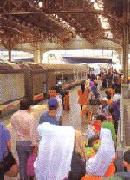
Pudu
Railway Station |
|
|
|
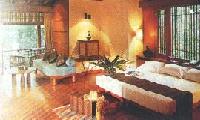 |
Getting Around :
Malaysia has excellent domestic air link and a well
developed and effective public transportation system served by buses, taxis and trains. |
| Accommodation
: Malaysia has
a wide range of accommodation at competitive rates, International standard
hotels, youth hostels and timeshare apartments are just some of the types
of accommodations available. Privately operated motor-homes are also
available for rental. |
|
|






